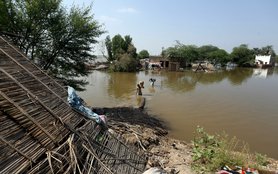As the UN sounded the alarm that we’re close to the point of no return on the climate crisis, the US Treasury published new guidance about phasing out support for fossil-fuel based energy. Is it enough?
by Jolie Schwarz and Christian Donaldson, Senior Policy Advisor - International Financial Institutions and Economic Justice with Oxfam International
Last week, we heard the shocking (if not surprising) news that we’re about to pass the point of no return if we don’t take decisive steps to stop burning fossil fuels, which are the main culprits for the climate crisis. The Intergovernmental Panel on Climate Change (IPCC, the United Nations body for assessing the science related to climate change) released a sobering report that sounded a clamoring alarm.
It underscored, again, the devastating and unequal impacts of the climate crisis. Despite being the least responsible, the poorest and most vulnerable communities experience the hardest blows. The weather events causing floods, wildfires, and droughts have displaced over 20 million people from their homes every year over the last decade.
On the heels of the report , the US Treasury Department published guidelines for how it will phase out international financing of carbon-intensive fossil fuel-based energy at the multilateral development banks[1] (MDBs). The guidance sets an important precedent, and we welcome the effort by this administration to expand beyond previous Treasury guidance; once limited to coal, it now includes oil and gas, and covers trickier forms of MDB lending (e.g., through intermediaries or budget support).
However, the guidance also lacks critical details that will determine how it will be implemented.
While wealthy countries are the main perpetrators of global warming—and must cut their emissions first and fastest—MDBs play an important role in helping developing countries transition away from fossil fuels and toward renewables. However, these MDBs are still actively financing fossil fuels; the World Bank alone financed at least $1.6 billion per year in fossil fuels from 2018 to 2020.
It’s possible that the much-anticipated Treasury guidance could spur the MDBs to transition away from fossil fuels more quickly. However, more clarity is needed. Below, we lay out three key concerns, and recommend how Treasury should implement the guidance to ensure it has the strongest impact:
Overall, the guidance is a welcome step forward, but is lacking in critical areas. The climate crisis demands a clear and decisive shift of resources away from fossil fuels toward a just transition and expansion of energy access for communities living in poverty.
_________________________________
[1] According to the federal website: “The Department of Treasury leads the Administration's engagement in the multilateral development banks (MDBs), which include the World Bank, Inter-American Development Bank, Asian Development Bank, the African Development Bank, and the European Bank for Reconstruction and Development.”


